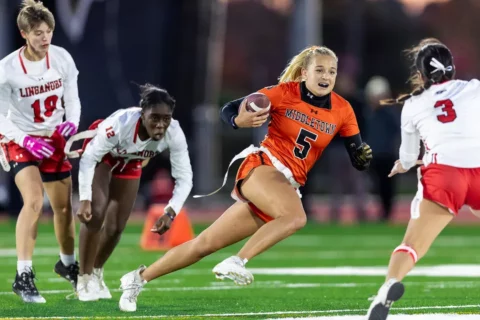A recently passed police reform bill in D.C. has already sparked a lawsuit by a police union in the District. Now, an official with the Fraternal Order of Police in Montgomery County, Maryland, said his union is considering possible legal action there to challenge a ban on police chokeholds and other reforms approved by the county council.
In Montgomery County, the bill that focused on police use of force has been signed into law by County Executive Marc Elrich.
The bill, passed on an expedited basis with a 9-0 vote by the county council, includes a number of changes that police representatives say will make the job of public safety more difficult, and possibly more dangerous.
Lee Holland, with the Fraternal Order of Police Lodge 35, which represents 1,200 Montgomery County police officers, said the ban on neck or carotid holds — commonly referred to as chokeholds — is problematic.
Holland said police “should not be using (chokeholds) as a way to gain control or anything like that — and that’s not what we do here in Montgomery County.”
But, he said that police officers, as a last resort, “should absolutely have the ability to use any means necessary” to defend themselves, including the ability to use carotid holds.
Montgomery County Council member Will Jawando, who introduced the police use-of-force bill, has argued the measure gives police officers flexibility.
“I think this strikes the right balance of preventing what we don’t want to happen but also leaving enough wiggle room in case an officer is in danger or the public is in danger from someone who is restrained,” he said shortly before the council approved the bill last month.
The police union said members also have concerns about changes to the way police stops can be conducted. Currently, police can stop someone for questioning based on “reasonable suspicion,” but the newly enacted legislation raises the standard to “probable cause,” Holland said.
He argued that could limit officers’ actions when a “lookout” is issued for a suspect.
“You would need someone who witnessed the crime to point and say, ‘That is the person,’ Holland said. “If the lookout maybe was descriptive enough, you might have enough there.”
Another concern that remains, Holland said, is the union’s role in how the new policies would be implemented. He argued that the FOP, as a union that has a collective bargaining agreement, should have a role in the process.
“If police don’t believe in the reforms, then the reforms are not going to work,” Holland said.
The May killing of George Floyd, who died in Minneapolis police custody, led to renewed calls for police reform across the U.S., including in the District, where the D.C. Council unanimously passed a police reform bill to prohibit chokeholds.
In D.C., the Fraternal Order of Police sued the District over that emergency bill that, among other things, removes the labor union from the disciplinary process. The federal lawsuit argues it effectively discriminates against the police labor group, stripping the union of the ability to shape policy, a power that other labor groups retain.
In Montgomery County, Holland said his organization is considering its options now that the county council bill has been signed by Elrich, and that includes possible legal action.








